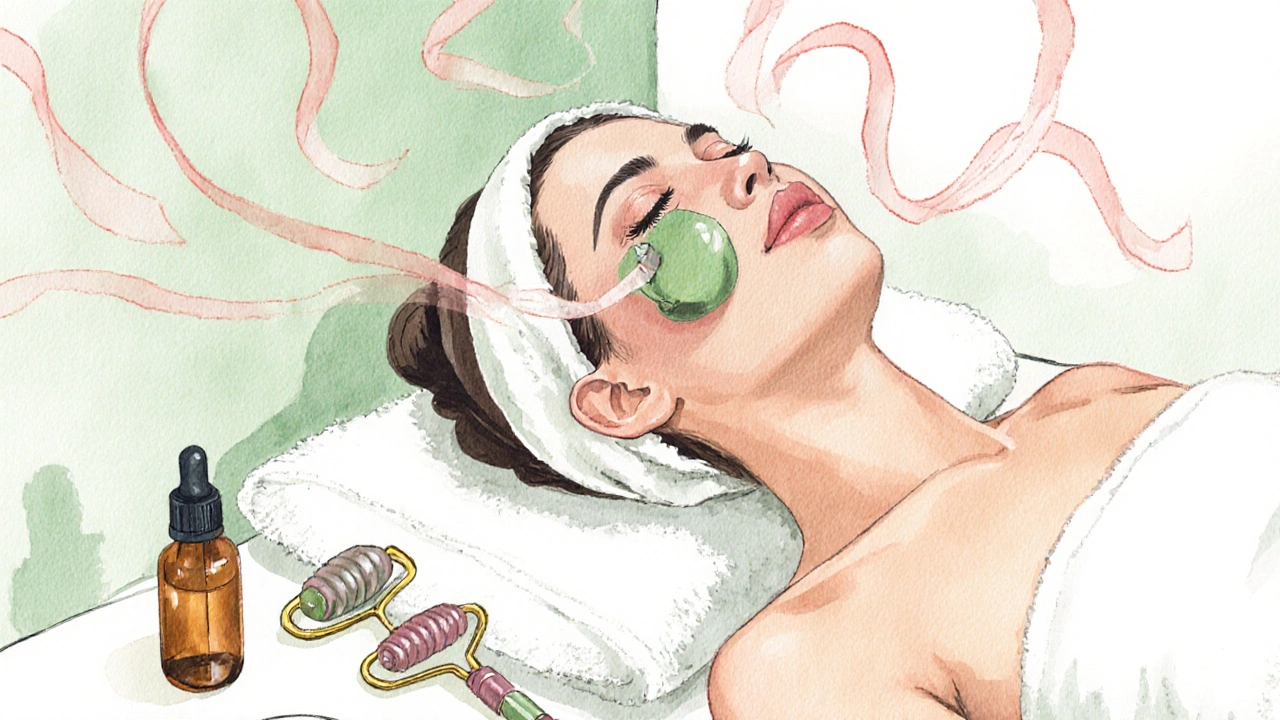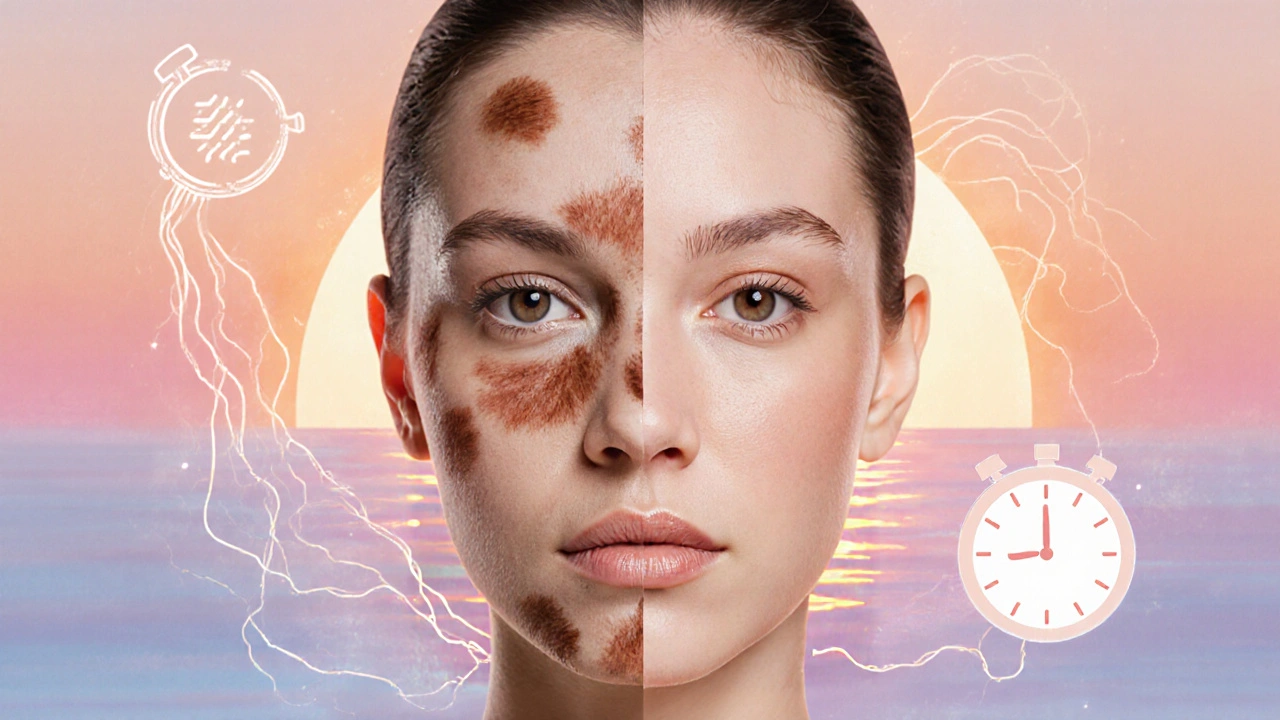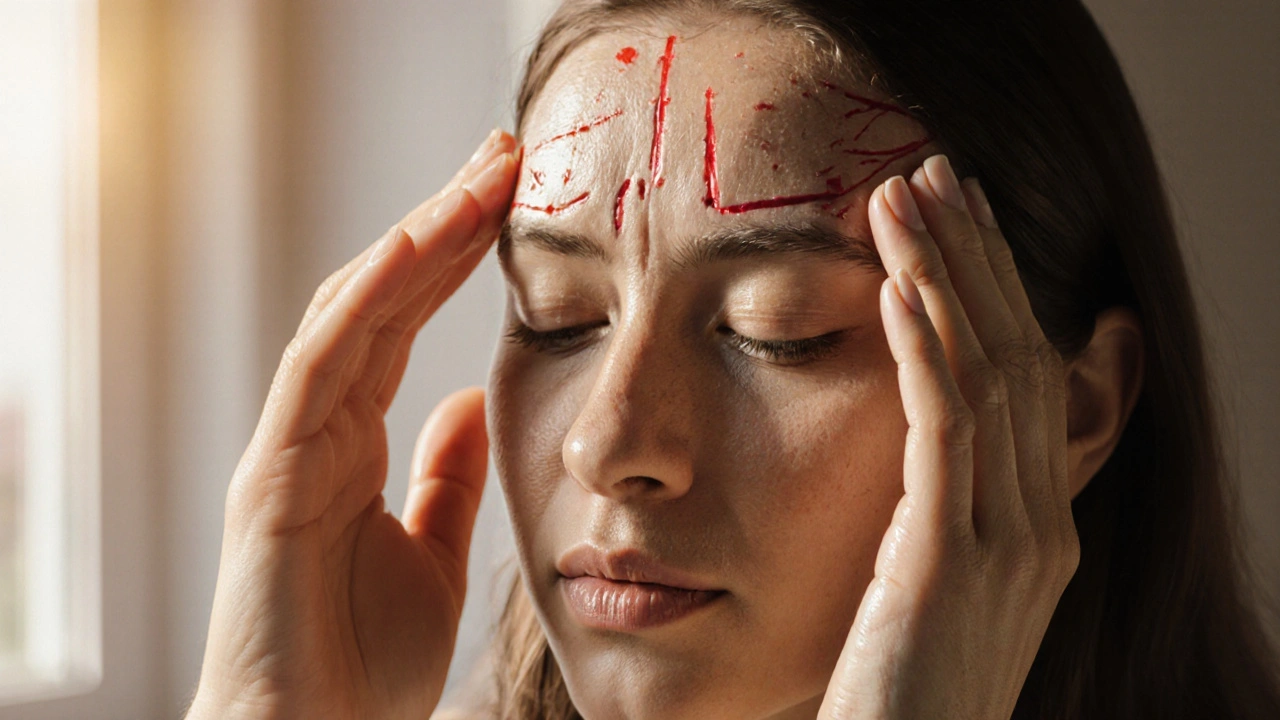Key Takeaways
- Facial massage improves blood flow and lymphatic drainage, which can soften melasma patches.
- Gentle techniques boost collagen, helping skin regain a more even tone.
- Combining massage with topical brighteners maximises results without harsh chemicals.
- Proper tools-like Gua Sha stones-make the practice safe and effective.
- Consistency matters: a short, daily routine beats occasional intense sessions.
When it comes to stubborn brown patches, many people jump straight to prescription creams or lasers. Yet there’s a gentler, cost‑effective ally that often gets overlooked: Facial Massage. By stimulating circulation, encouraging lymphatic drainage, and nudging collagen production, this hands‑on practice can tone down the appearance of melasma while supporting overall skin health.
Below, we break down why facial massage works, walk through safe techniques, and compare it with other common melasma interventions. Whether you’re a melasma newbie or a seasoned skincare enthusiast, you’ll find a practical plan you can start tonight.
Why Facial Massage Impacts Melasma
Melasma is a form of Hyperpigmentation that usually shows up as symmetrical, dark patches on the cheeks, forehead, or upper lip. Hormonal shifts, sun exposure, and inflammation trigger melanocytes to produce excess melanin. While topical agents target melanin directly, massage attacks the problem from a different angle.
First, massage boosts Circulation. Better blood flow means more oxygen and nutrients reach skin cells, which helps them repair pigment irregularities faster. Second, the gentle pressure activates the Lymphatic Drainage system, clearing out metabolic waste that can otherwise linger and inflame melasma‑prone areas. Third, repeated strokes stimulate fibroblasts, leading to increased Collagen Production. More collagen improves skin elasticity and can diffuse the visual contrast of dark spots.
Finally, the calming nature of massage reduces stress‑related cortisol spikes, which are known to worsen melasma. In short, facial massage tackles melasma holistically-vascular, lymphatic, structural, and hormonal pathways-all without abrasive chemicals.
Core Techniques for Melasma‑Focused Massage
- Cleanse your face thoroughly using a mild cleanser. Remove makeup, sunscreen, and any residue that could cause friction.
- Apply a thin layer of a skin‑friendly carrier oil (e.g., jojoba or rosehip). These oils are non‑comedogenic and help the fingers glide smoothly.
- Effleurage (light sweeping strokes): Using the pads of your fingers, move from the centre of the forehead outward to the temples. Repeat 5‑7 times per side.
- Petrissage (gentle kneading): With the base of your thumb and index finger, lightly press and release on each melasma patch for 10‑15 seconds. This encourages deeper tissue relaxation.
- Lymphatic drainage strokes: Place your fingers on the cheekbone, then glide towards the ear lobe in a wave‑like motion. Perform 3‑4 cycles per side.
- Finish with a light tapping (tapotement) along the jawline and under the eyes to boost final circulation.
Each session should last no more than 5‑7 minutes. Over‑massaging can irritate the skin and potentially darken melasma, so stay gentle.

Tools & Products That Enhance Results
While you can perform the above steps with just your hands, a few well‑chosen tools can increase efficacy and safety.
- Gua Sha stone: A smooth, flat crystal (often jade or rose quartz). Hold it at a 15‑degree angle and glide it across the skin following the same directions described above.
- Facial rollers: Dual‑ended rollers (smooth stone on one side, textured on the other) can add a mild vibrational effect that further stimulates lymph flow.
- Essential oils: A couple of drops of Rosehip seed oil or Licorice extract can provide extra brightening benefits. Always dilute in a carrier oil and patch‑test first.
Remember, the tool itself isn’t magic; the technique matters more. Choose a smooth, non‑porous surface to avoid harboring bacteria.
Integrating Massage into Your Daily Skincare Routine
Consistency beats intensity. Here’s a quick, morning‑friendly routine you can pair with your existing melasma regimen (e.g., sunscreen, azelaic acid, or tranexamic acid).
- After cleansing, apply a thin layer of your favourite brightening serum.
- Layer a few drops of carrier oil on top.
- Perform the 5‑minute massage sequence.
- Pat in any remaining product with clean fingertips.
- Finish with a broad‑spectrum SPF 30+ sunscreen-your most important melasma defense.
Even on busy days, a 2‑minute “mini‑massage” focusing on the forehead and cheeks can keep circulation up and prevent pigment from settling.

Facial Massage vs. Other Melasma Treatments
| Attribute | Facial Massage | Topical Brighteners (e.g., Azelaic Acid) | Laser Therapy | Chemical Peel |
|---|---|---|---|---|
| Cost per month | Low (oil + basic tool) | Medium (prescription cost) | High (clinic visits) | Medium‑High (professional peel) |
| Side‑effects | Minimal if done gently | Possible irritation, dryness | Redness, post‑inflammatory hyperpigmentation | Peeling, temporary redness |
| Time to see improvement | 4‑6 weeks (consistent use) | 6‑12 weeks | 1‑3 sessions | 1‑2 sessions |
| Impact on overall skin health | Boosts circulation & collagen | Targets melanin production | Resets superficial pigment | Exfoliates dead skin layers |
| Suitability for sensitive skin | High (if using gentle pressure) | Variable (depends on formulation) | Low (risk of flare‑up) | Low‑Medium (depends on peel strength) |
The table highlights that facial massage is the most budget‑friendly and low‑risk option, especially for those who already struggle with skin sensitivity. It isn’t a quick fix like laser, but its cumulative benefits to overall skin resilience make it a worthy addition to any melasma management plan.
Common Mistakes & Safety Tips
- Using too much pressure - it can cause micro‑tears and increase pigment.
- Skipping sunscreen - UV exposure will undo any progress made.
- Massaging over broken or inflamed skin - wait until lesions heal.
- Choosing harsh oils - opt for non‑comedogenic, fragrance‑free options.
- Neglecting hygiene - clean tools after each use to avoid bacterial buildup.
If you have severe melasma (e.g., large patches covering more than 10% of the face), consider consulting a Dermatologist before starting any new regimen. They can help you blend massage with prescription‑grade treatments safely.
Frequently Asked Questions
Can facial massage remove melasma completely?
Massage can significantly lighten patches by improving circulation and lymph flow, but it rarely eliminates melasma on its own. Combining it with proven topical agents yields the best results.
How often should I perform the massage?
A short 5‑minute session once daily is ideal. If you’re short on time, a 2‑minute mini‑massage twice a day still helps maintain blood flow.
Are certain tools better for melasma‑prone skin?
Smooth, non‑porous tools like Gua Sha stones or silicone rollers are recommended. Avoid rough textures that could irritate the skin.
Should I use essential oils during the massage?
A few drops of brightening oils like licorice or rosehip can boost results, but always dilute them in a carrier oil and do a patch test first.
Is facial massage safe for all skin types?
Yes, when performed gently. Those with extremely sensitive skin should use lighter pressure and stick to hypoallergenic oils.
Give facial massage a try for at least a month and track changes with photos. You’ll likely notice not just lighter melasma but also a fresher, more radiant complexion.


Comments
Wow, this guide is a burst of sunshine! 🌞 Your step‑by‑step breakdown makes it super easy to slip a quick facial massage into any routine, and the emojis really brighten the read. I love how you highlighted the gentle pressure tip – that’s the secret sauce for keeping melasma calm. Keep shining, you’ve inspired me to give my skin a daily dose of love! 💖
Nice work, this looks easy to do every morning. Just a few minutes and you’re already boosting circulation. I’m gonna try it with my jade roller tomorrow.
The philosophy behind facial massage, particularly in the context of melasma, invites us to contemplate the interdependence of vascular dynamics, lymphatic clearance, and dermal architecture; indeed, each gentle stroke acts as a conduit for biochemical signaling, thereby fostering an environment conducive to pigment regulation. One might argue that the act of effleurage does not merely stimulate superficial blood flow, but also orchestrates a cascade of nitric oxide release, which in turn modulates melanocyte activity. Moreover, the rhythmic pressure applied during petrissage can precipitate microscopic deformation of the extracellular matrix, prompting fibroblasts to up‑regulate collagen synthesis-a process that subtly remodels the skin’s optical properties. It is essential to recognize, however, that excessive force could paradoxically incite inflammation, leading to post‑inflammatory hyperpigmentation; thus, moderation remains a cardinal principle. The inclusion of carrier oils, such as jojoba or rosehip, is not a trivial detail; these lipids reduce friction, preserve the stratum corneum’s barrier function, and may deliver bioactive compounds that synergize with the mechanical stimulus. While the table presented juxtaposes massage against lasers and peels, one must not overlook the psychosomatic dimension: the soothing ritual can attenuate cortisol spikes, a hormonal driver known to exacerbate melasma. Consequently, the practice operates on a dual axis-physiological and psychological-both of which converge to dilute the visual impact of hyperpigmented lesions. From an evidence‑based perspective, longitudinal studies suggest observable lightening after four to six weeks of consistent application; this temporal frame aligns with the turnover rate of epidermal keratinocytes. It is also prudent to pair massage with a broad‑spectrum sunscreen, for ultraviolet radiation remains the most formidable antagonist in melasma management. In summation, facial massage emerges as a modest yet potent adjunct, weaving together circulation, lymphatic drainage, collagen induction, and stress reduction into a cohesive therapeutic tapestry; its low cost and minimal adverse‑event profile render it an attractive option for many seeking sustainable skin health. Practitioners should also consider the frequency of sessions, as daily brief massages have shown greater cumulative benefit than sporadic intensive routines. Additionally, individuals with rosacea or active dermatitis should adapt the pressure to avoid triggering flare‑ups. The synergistic effect of combining massage with topical agents like azelaic acid can amplify melanocyte inhibition through enhanced penetration. Empirical anecdotal reports frequently highlight improved skin radiance and reduced erythema alongside pigment lightening. Ultimately, the modest time investment aligns with broader wellness habits, reinforcing a holistic approach to dermatologic care.
Honestly, this sounds like another DIY gimmick.
Oh great, because what my skin really needed was a 5‑minute arm‑waving session with a fancy rock. 🙄
I appreciate the thoroughness of the guide; the step‑by‑step layout makes it easy to follow, and the emphasis on non‑comedogenic oils shows a solid understanding of sensitive skin needs.
I think this is a awsome approach-like, you can do it every day and not spend a lot. Just remember to keep the pressure super gentle, otherwise you might irritate the patches. Also, don’t forget the SPF, that’s real important! :)
The comparison table is quite helpful; it puts the benefits and drawbacks into perspective without overwhelming the reader.
Totally agree! 🙌 A quick morning massage can be a game‑changer, especially when you pair it with a good sunscreen. Keep it up, you’ve got this! 😊
Yo, that guide is legit! I’m gonna try the lingual strokes tomorrow, gonna be awesome!!